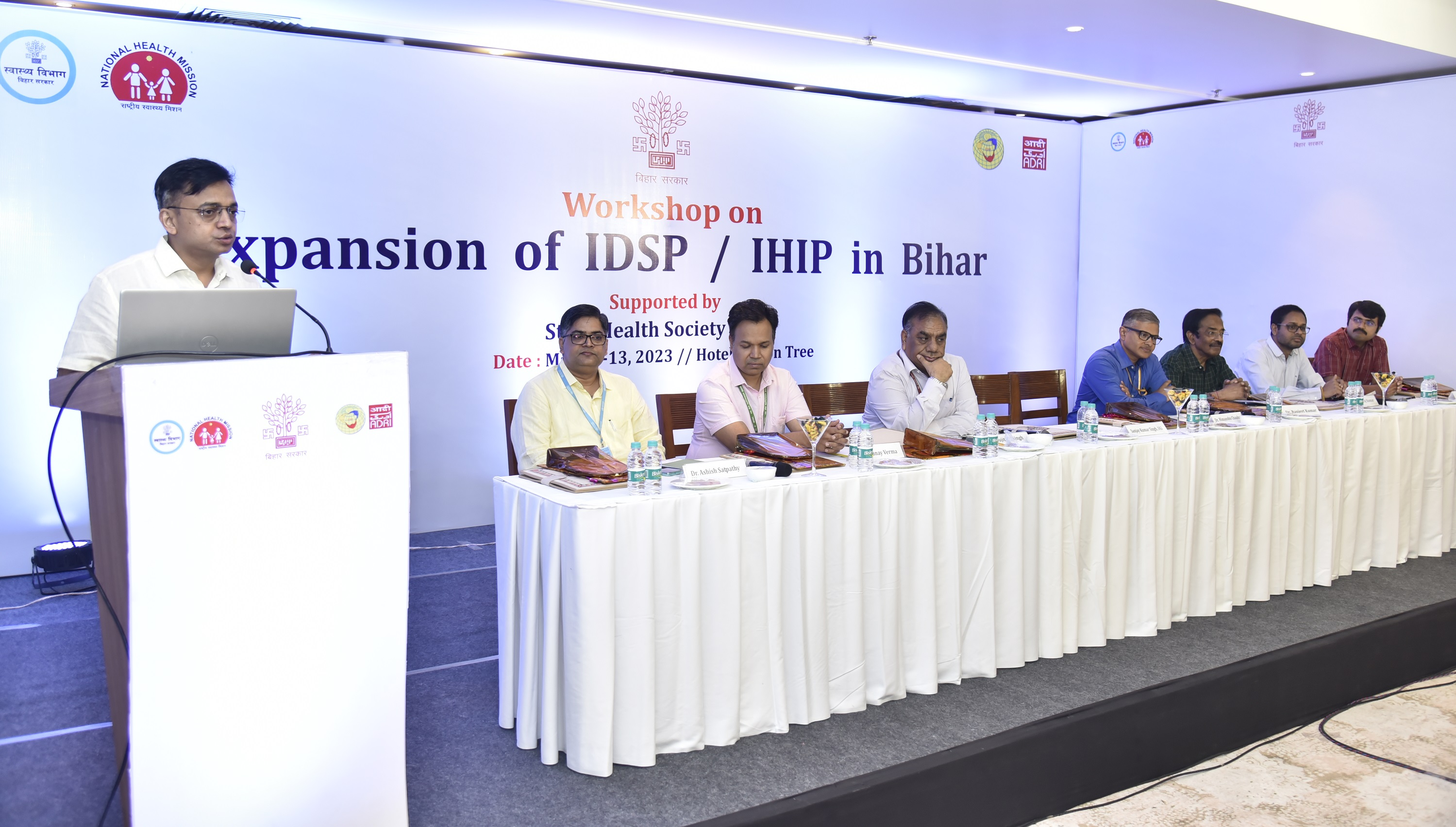Events of CHP

Patna, 12 May. A two-day workshop titled “Expansion of IDSP/IHIP in Bihar” organized by the State Health Society, Bihar and supported by the Centre for Health Policy (CHP) at the Asian Development Research Institute (ADRI) along with the National Centre for Disease Control (NCDC), Ministry of Health and Family Welfare, Government of India commenced today. While delivering the Keynote Address of the Inaugural Session at this workshop, Shree Sanjay Kr. Singh, ED, State Health Society of Bihar (SHSB) lauded Bihar for having managed to reduce the spread of infectious diseases considerably but he said that we should not rest on our laurels. This performance needs to be sustained. The mainstream Medicare system used to emphasize the treatment and management of diseases earlier but the need of the hour is to rein in the private sector for strengthening prevention of the outbreak of infectious diseases. He added that Bihar is the first state in the nation where the private sector has been proving Tuberculosis transmission data. He congratulated all the District Epidemiologists of Bihar for being the unsung heroes of this containment campaign. Also, a software christened “Bhavya Digital Platform” has been floated in order to provide ready reference of data.
Earlier, in a Special Address, Dr. Himanshu Chauhan, NPO, Integrated Disease Surveillance Program (IDSP) announced that Bihar figures in the top ten states of the nation as far as surveillance of communicable diseases using the Integrated Health Information Platform (IHIP) is concerned. The challenge, he added, is to sustain and expand surveillance by seamlessly integrating the private sector. Dr. Sujit Singh, Advisor, NCDC pointed out in another Special Address that the primary aim of IDSP is to prevent the outbreak of some 33 infectious diseases using data generated on the IHIP. Such an aim was a case of being easier said than done and warranted the training and motivation of grass-root workers. Bihar is positioned at number 3 among states which are involving private hospitals to share their data, particularly of infectious diseases. This good performance needs to be sustained and monitored regularly. Dr. Ranjeet Kumar, State Surveillance Officer, SHSB motivated the health personnel by remarking that it was due to their efforts that Bihar had performed well in disease surveillance. Dr. Dewang Jariwala of WHO-IHIP opined that the next stage was better co-ordination among different players in the IDSP.
Other experts who spoke on the occasion were Dr. Ashish Satpathy of WHO, Dr. Neeraj Kumar of NCDC, and Dr. Pranay of NCDC, Dr. Ragini Mishra, State Epidemiologist, IDSP Cell delivered the Welcome Address and compered the Inaugural Session. Dr. Sanchita Mahapatra of CHP-ADRI proposed the Vote of Thanks. She said that Bihar has crossed a IHIP reporting figure which exceeds 90 percent now.
Patna, May 13. India’s response and preparedness in digital technology and the game-changing Artificial Intelligence (AI), which will have to be primarily led by the younger generation, will ultimately determine its future prospects. This was prophesized by Shree Pratyaya Amrit, ACS, Department of Health, Government of Bihar today at a workshop titled “Expansion of IDSP/IHIP in Bihar” organized by the National Centre for Disease Control (NCDC), Ministry of Health and Family Welfare, Government of India and the State Health Society, Bihar (SHSB). This event’s organization was also supported by the Centre for Health Policy(CHP) at the Asian Development Research Institute (ADRI).
Citing the example of increasing use of ChatGPT, Open Network for Digital Commerce (ONDC), and Unified Payment Interface (UPI) in our country, he remarked that we are moving in the right direction. He then dwelt on the lacuna of lack of data from private hospitals and the medical colleges on the Integrated Health Information Platform (IHIP). This, he said, needs to be addressed. Also, the initiative of Digital Public Infrastructure (DPI) will smoothen the inter-operability of different hospitals as it will be mandatory for them to share data with others. It is very important to have clean and robust data in order to empower our response to outbreaks of infectious diseases. He announced that a Metropolitan Surveillance Unit is going to be established in Patna with the assistance of the central government.
Earlier, Shree Sanjay Kr. Singh, ED, SHSB reiterated the importance of participation of the private hospitals, which had a significant foot fall, in sharing of data for proper surveillance of disease and saving of precious lives. Currently, the data is only being furnished by government hospitals on the IHIP and consequently remains incomplete. Dr. Sujit Singh, Advisor, NCDC, revealed that Bihar was only the third Indian state whose private sector health institutions had been chosen to participate in the sharing of data on the IHIP. Dr. Himanshu Chauhan, NPO, Integrated Disease Surveillance Program remarked that the good performance shown by Bihar in reporting engenders the need for it to be more responsible. Dr. Ranjit Kumar, State Surveillance Officer, SHSB, cautioned us by saying that some 30 viruses are still at large in our environment and pose great danger. Effective surveillance of these viruses is imperative for prevention of future outbreaks. Moreover, surveillance of reporting on the IHIP will be undertaken by hospitals, laboratories and medical colleges in the private sector.
Dr. Dewang Jariwala and Dr. Ujjwal Sinha of WHO along with Dr. Neeraj Kumar and Dr. Pranay Verma of NCDC also aired their views on this occasion. More than a hundred attendees from private and state medical colleges along with representatives from different laboratories of Bihar were present. Dr. Ragini Mishra, State Epidemiologist, IDSP Cell anchored the session. The Vote of Thanks was proposed by Dr. Ranjit Kumar, State Surveillance Officer, SHSB.